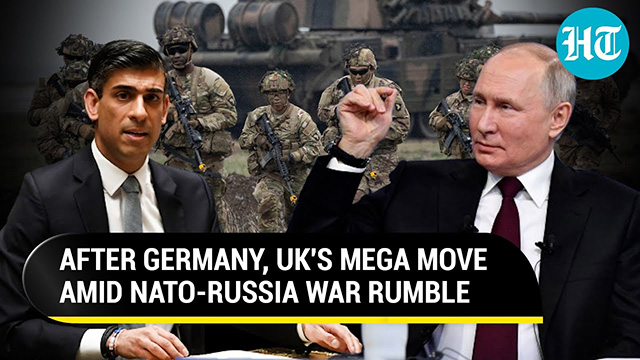
Europe should arm against barbarians at its gates. To ensure peace, the Continent should prepare for war. Europe needs to beef up its military forces, insists Martin Ivens, the editor of the Times Literary Supplement and previously, an editor of the Sunday Times of London and its chief political commentator.
But with its depleted armed forces unprepared to fight a major war, or perhaps any kind of war, on its own, Europe (Brexit Britain included) has come to resemble the rich and feeble late Roman Empire that depended on unreliable mercenaries for its security.
“The foundations of the world order are being shaken to their core,” UK Defence Secretary Grant Shapps warned in a speech last week. Russia, China, Iran and North Korea are challenging the status quo and America’s armed forces are overstretched. Shapps’ description of a “pre-war” crisis is right — but what is his Conservative government and its European partners prepared to do about it?
After the Iowa caucus in the US, the odds have shortened on Donald’s Trump return to the Oval Office. In 2020, Trump told Ursula von der Leyen, the European Commission president that “NATO is dead.” It would be prudent to take him at his word. If a Trump administration abandons Ukraine in its hour of need and makes good on threats to make Europe take responsibility for its own protection, a revolution in military and diplomatic thinking will be required. The continent looks wholly unprepared for it.
Geography dictates, that Russia will always be a factor in European affairs. Talking to diplomats in Asia in recent weeks, I detected a similar pessimism about America’s long-term commitment. Meantime, China isn’t going anywhere; it’s been the dominant political and cultural power in the region for millennia.
Admiral Bob Bauer, the Dutch chairman of NATO’s military committee, warned Europe to prepare for war with Russia within 20 years — and that’s the optimistic view. Earlier Estonian Prime Minister Kaja Kallas declared that the alliance may have only between three to five years. Ukraine is Europe’s front line of defense; if Kyiv is forced to accept a ceasefire, then the Baltic states are likely to be the Kremlin’s next target, says Kallas.
In a war of attrition Ukraine, minus Western aid, loses. Russia’s economy is nearly 14 times bigger than Ukraine’s and its defense budget amounts to 6.5% of GDP, having risen by 68% last year. Western enthusiasm for the fight is flagging, while $61 billion worth of American military assistance to Ukraine has been held up by Trump’s Republican supporters in Congress who want the money spent on domestic programs. The European Union has also failed to deliver on its promise to send a million artillery shells to Kyiv by next month. Last summer, Ukraine was firing 7,000 shells a day in its counteroffensive against Russia. Now, that’s down to 2,000 a day.
The UK has been the cheerleader for Ukraine from the beginning of the Russian invasion and makes much of its military might. Shapps boasts that the Royal Navy, the British Army and the Royal Air Force will deploy 20,000 personnel to take part in the NATO exercise Steadfast Defender 24, which runs from next week until May, with the alliance fielding 90,000 troops in all. British deployment across eastern Europe will include 16,000 soldiers, the Royal Navy will commit 2,000 sailors across eight warships and submarines, while 400 Royal Marines will be dispatched to the Arctic Circle.
Yet the UK’s commitment to NATO’s forward defense has been run down. It leads one battle group in Estonia, having halved its deployment there since 2022. In fact, Britain fields less than 900 soldiers on rotating tours, although they are getting better kit these days. What would happen in a real shooting war? The army’s combat strength has been reduced to 76,000 troops, its lowest number since Napoleon threatened invasion.
Two centuries ago, Britain commanded the biggest, most battle-hardened fleet in the world. Today, the Royal Navy, like the army, is a shadow of its former self. It can’t even recruit enough sailors to run its warships. In the current conflict in the Red Sea, RAF Typhoon fighter-bombers had to strike the Houthis from bases 2,600 miles away in Cyprus. The US has deployed an aircraft carrier, but Britain’s two carriers are back home in Portsmouth awaiting refits — and speculation has been rife that Shapps’s predecessor wanted to mothball or sell one of the hugely expensive vessels.
The British general election this year will be fought about "butter," not "guns," as the Conservatives promise more tax cuts, leaving little money left over for defense.
We live in unreal times. The barbarians are at the gates, but Europe acts as if they weren’t there.
…In 1949, US Defence Secretary James Forrestal went crazy and jumped out of a window shouting: “The Russians are coming!” Now the English author has gone the ‘Forrestal way’– there are many windows in England and it is impossible to close them all.
read more in our Telegram-channel https://t.me/The_International_Affairs

 11:33 21.01.2024 •
11:33 21.01.2024 •






















